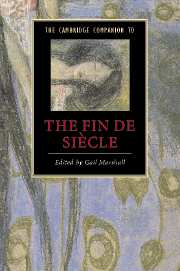Book contents
- Frontmatter
- Introduction
- 1 Psychology at the fin de siècle
- 2 Decadence and aestheticism
- 3 Sexual identity at the fin de siècle
- 4 Socialism and radicalism
- 5 Empire
- 6 Publishing industries and practices
- 7 The visual arts
- 8 The New Woman and feminist fictions
- 9 Realism
- 10 The fantastic fiction of the fin de siècle
- 11 Varieties of performance at the turn of the century
- 12 Poetry
- Guide to further reading
- Index
- Series List
6 - Publishing industries and practices
Published online by Cambridge University Press: 28 September 2008
- Frontmatter
- Introduction
- 1 Psychology at the fin de siècle
- 2 Decadence and aestheticism
- 3 Sexual identity at the fin de siècle
- 4 Socialism and radicalism
- 5 Empire
- 6 Publishing industries and practices
- 7 The visual arts
- 8 The New Woman and feminist fictions
- 9 Realism
- 10 The fantastic fiction of the fin de siècle
- 11 Varieties of performance at the turn of the century
- 12 Poetry
- Guide to further reading
- Index
- Series List
Summary
'The real revolution in British publishing in the reign of Queen Victoria was that it became a fully fledged industry, turning over millions of pounds, conducting its affairs in a businesslike manner, and dealing fairly with the different interest groups within it and around it.' So wrote John Feather in 1988, using a term ('industry') that the twentieth century came to accept as a seemingly uncontroversial and unproblematic one to describe the sphere from which texts issue and through which they circulate. At the fin de siècle, however, no one could have called publishing an 'industry' so breezily, without comment. The word still bore a wealth of associations and evoked a wide range of both negative and positive feelings that made its usage a vexed matter. It was a label fraught with political meaning, and some members of the late-Victorian world of books and periodicals accepted it gladly, even as others rejected it as antithetical to their beliefs and to the ways in which they worked or wished to work. With so many of the important ideological conflicts at the end of the nineteenth century focused on labour, the notion of publishing as occupying the status of an industry inserted itself squarely amidst these discussions, and was much debated. The image of machinery, moreover, on which this idea relied - whether of factory machines or of the human brain and hands as potential sources of mechanised and standardised labour - had enormous resonance among publishers, printers, editors and authors alike.
One response, as modelled by the Aesthetes of the 1880s and 1890s, was to deny outright that Art (always with a capital 'A') had anything to do with the collective undertakings and division of labour demanded by industrial practices; neither did it have any relationship to industriousness. The making of literature was, the Aesthetes insisted, solitary, private, impossible to bind to a schedule, and equally impossible to document.
- Type
- Chapter
- Information
- The Cambridge Companion to the Fin de Siècle , pp. 113 - 130Publisher: Cambridge University PressPrint publication year: 2007
- 4
- Cited by

